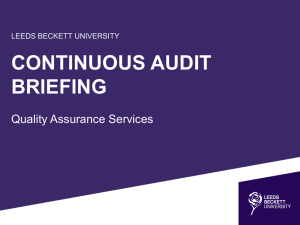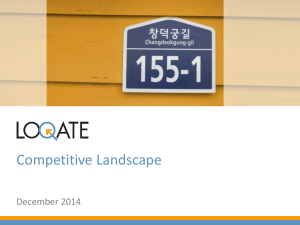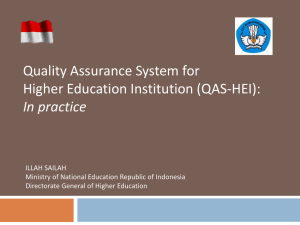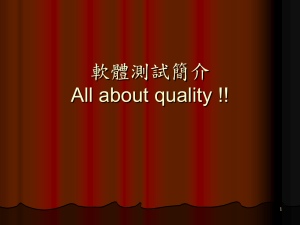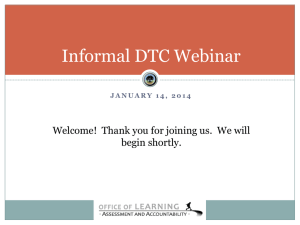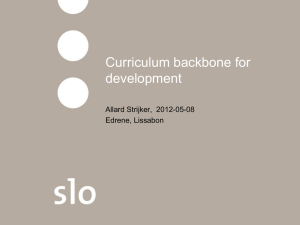Quality and Effectiveness Assessment in Higher
advertisement
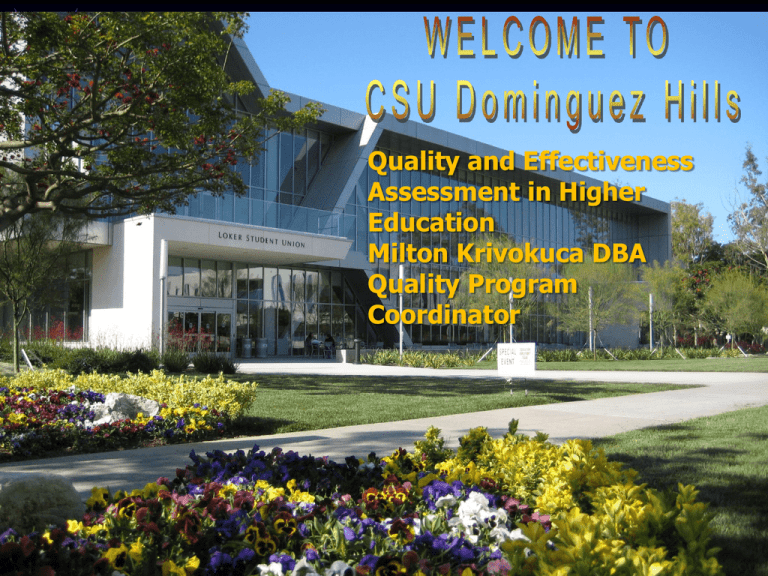
Quality and Effectiveness Assessment in Higher Education Milton Krivokuca DBA Quality Program Coordinator Objectives for this presentation: Develop and deliver an academic program using Quality tools and techniques. Academic Planning Academic planning must support university goals Faculty have primary responsibility for curriculum development Faculty Senate typically reviews/approves/ recommends course and program development Course/program learning outcomes must be clearly stated Learning outcomes assessment must be defined Resource implications must be stated Faculty, staff, facilities, funding requirements, implications for accreditation Academic Planning Periodic review of programs Provost/Academic Vice President makes recommendation to the President In university systems special approval is required for some programs. California State University, Dominguez Hills College of Extended & International Education Master of Science In Quality Assurance Master of Science Quality Assurance The master of Science in Quality Assurance (MSQA) is designed to prepare professionals in quality, engineering, science, management, health care, government and service industries for career advancement. FACULTY ONE FULL TIME COORDINATOR SIXTEEN PART TIME FIVE DOCTORATES ELEVEN MASTERS - INCLUDING FIVE PROFESSIONAL ENGINEERS MAJORITY OF FACULTY ARE PRACTICING PROFESSIONAL QUALITY ENGINEERS AND MANAGERS/DIRECTORS/VP’S SEVERAL INDUSTRY RECOGNIZED SUBJECT MATTER EXPERTS College of Business Administration & Public Policy MSQA Curriculum Design and Assessment Overview of MSQA Curriculum and Assessment Processes 8 Curriculum Design & Assessment: Alignment of Learning Objectives MSQA Mission Learning Standards for the Program Program Goals for Each Course Learning Objectives Assessment at the Course Level 9 MSQA Assessment Process Verify MSQA SLO’s align with university mission Map the curriculum to SLO’s per course Assess effectiveness of meeting each SLO Analyze results Advisory board meeting University Mission – Program Mission Basis to Map Curriculum MSQA Program Course Lists Manufacturing Concentration: QAS 510 QAS 511 QAS 512 QAS 513 QAS 514 QAS 515 QAS 516 QAS 518 QAS 598S QAS 599 Elective Advanced Probability and Statistics3 Units Quality Function Management and TQM Reliability Statistical Quality Control and Sampling Advanced Experimental Design Human Factors in Quality Assurance Measurement and Testing Techniques Quality Project Management & Productivity Directed Research Project (with approval of Academic Coordinator) Total: 3 3 3 3 3 3 3 3 3 3 Units Units Units Units Units Units Units Units Units Units 33 Units MSQA Program Course Lists Service and Health Care Concentration: QAS 511 QAS 515 QAS 516 QAS 518 QAS 530 QAS 531 QAS 532 QAS 598S QAS 599 Elective Quality Function Management and TQM Human Factors in Quality Assurance Measurement and Testing Techniques Quality Project Management & Productivity Statistical Quality Control for Service Professionals Customer Satisfaction & Quality Assurance Quality Assurance for the Service Delivery Process Directed Research Project 3 Courses (with approval of Academic Coordinator) Total: 3 3 3 3 3 3 3 3 3 9 Units Units Units Units Units Units Units Units Units Units 33 Units MSQA Program – New Courses for 2010! QAS 534 QAS 535 QAS 536 QAS 537 QAS 538 QAS 539 QAS 540 QAS 541 QAS 542 Change Management Lean Manufacturing Six Sigma Principles and Application Qualify Function Deployment: Understanding Customer Requirements Evaluation and Outcome for Healthcare Delivery Good Manufacturing Practices Food & Drug Law Biomedical Quality Control methods Risk Management in FDA Regulated Industries Curriculum Map Program SLO Mapping Assessment Planning Assessment Letter to Faculty Faculty assessor: ___William Trappen______________ MSQA Student Learning Outcomes #1, #3, #5, #7, and #8 MSQA Course Level Objective #1 Apply advanced principles and tools from quality and measurement science to problem solving and measuring reliability and performance in production and service industries MSQA Course Level Objective #3 Evaluate complex, integrated organizational systems and processes in order to recognize and measure system failures scientifically, synthesize data and form solutions MSQA Course Level Objective #5 Demonstrate the ability to conduct and present independent research using primary and secondary sources, analyze information, interpret data, draw conclusions MSQA Course Level Objective #7 Design a quality system or process to meet industry standards or quality system compliance requirements. MSQA Course Level Objective #8 Identify, formulate and solve quality problems involving physical, human, and economic parameters inherent to core processes for both manufacturing and service focused industries. Spring 2013 Assessment MSQA SLO Map Spring 2013 Unbalanced SLOs Survey Questions – Lickert Scale 1 -5 The MSQA program provided me with skills that I can immediately apply 4.5 The MSQA staff at the university were supportive of my needs and were a dependable resource. 4.25 The faculty were knowledgeable and approachable to assist with issues or questions. 4.5 Survey Questions – Lickert Scale 1 -5 I feel that the personal value I received from form time and effort will be rewarding in my career 4.25 I would recommend the MSQA program to a friend or professional associate interested in advancing his or her knowledge of Quality. 4.6 Graduate Survey Results 2011 Graduate Survey Results Q1 1 2 3 4 5 6 7 8 9 10 11 12 Q2 Q3 Q4 1 5 5 5 5 5 5 4 4 5 5 5 3 5 1 5 5 5 5 4 5 5 5 3 4 4 2 5 5 5 5 5 5 4 5 5 54 4.5 51 4.25 54 4.5 Milt Krivokuca Q5 4 4 5 5 4 5 4 4 5 5 5 5 3 5 4 5 5 5 4 4 5 5 5 5 15 23 17 25 24 25 23 21 24 24 25 23 51 55 4.25 4.583333 269 22.41667 Survey – Two years after graduation MSQA Graduate Survey Please circle the term that is most applicable to your current job assignment. Since graduating from the MSQA program: 1. I utilize tools and methodologies learned in the program: Not Applicable Never Occasionally Frequently 2. Since completing the MSQA, I have (circle all that apply) Received a raise Received a promotion Made a positive career change Made a negative career change Received a performance award Became unemployed Gave back to the community through volunteer efforts Became active in ASQ or another professional society 3. I would recommend the MSQA to someone interested in attaining an advanced education in quality Yes No 4. To help my career, the MSQA could have included (circle all that apply): More practical SPC exercises Additional case studies More industry specific elective course opportunities ________________________________________ ________________________________________ 5. Any additional comments that will help us to improve the MSQA curriculum? ______________________________________________________________ ______________________________________________________________ Survey Results Spring 2013 Advisory Board Meeting March 15, 2013 Agenda for Advisory Board Meeting General Welcome - 15 Minutes Introductions – 15 minutes Program Status – 15 minutes Assessment -20 minutes Breakout Sessions – 95 minutes Closing reports – 20 minutes 3 Hours total! Advisory Board Report Spring 2013 CSUDH Advisory Board Meeting Following are the action plans developed as a result of the March 15, 2013 Advisory Board meeting. The information gained from this meeting was evaluated and developed into a realistic action plan. The planned activities will assure the CSUDH Quality programs remain current in the content and support the mission of the University, College of Extended and International and Extended Education, as well as the program itself. Item I: Develop CEU certificate program to support the Measurement Science Conference. Item II: Request additional information as to the goal for developing CEU credit for CCE CAPE training. Item III: Formalize BSQA Metrology Certificate of Completion Item IV: Contact instructors for QAS 512, 513, and 514 to include class assignment or activity supporting MSQA SLO #4. Item V: Revise QAS 538 to address biostatistics. This revision will further address SLOC #7 and review if revised QAS 538 can replace QAS 530 for a Healthcare specific MSQA track. Item VI: Revise SLOCs #4 and #7 to be more applicable to the current needs of Quality professionals. Item VII:Develop new version of QAS523 Software Quality. Place QAS 523 in refrigerator. New course to include elements of software quality, but move focus to IT and suspect/counterfeit issues. Item VIII: Develop three (3) new MSQA elective courses: Hoshin Planning, Sustaining Quality Improvement, Laboratory Accreditation and Proficiency Testing IX: Revise MSQA program to 3 tracks, Manufacturing (minor program changes), Service (minor program changes), and Healthcare (new track, but existing classes available for this track). Milt Krivokuca April 1, 2013 Next Steps: Prioritize the Action Plan per the University Program and Course revisions policy. The Final Results Educational Excellence! Thank You! Milton Krivokuca DBA Quality Program Coordinator mkrivokuca@csudh.edu
